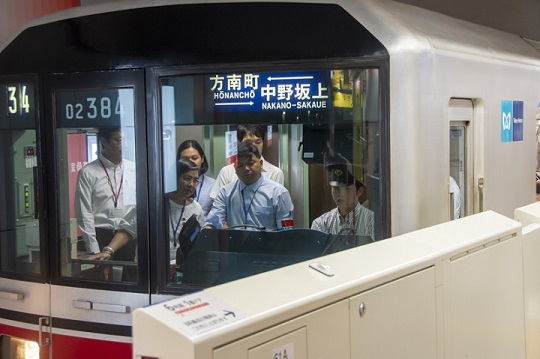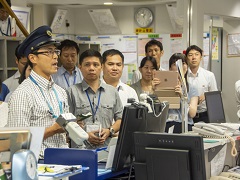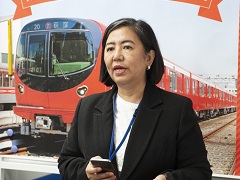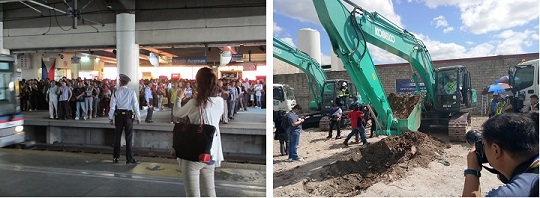- Home
- News & Features
- News
- FY2019
- Tokyo Metro and others cooperate in railway personnel development: Utilizing Japan's railway expertise to solve traffic issues in Manila, Philippines
News
December 13, 2019
Tokyo Metro and others cooperate in railway personnel development: Utilizing Japan's railway expertise to solve traffic issues in Manila, Philippines
“It was impressive to see the station staff keeping a careful eye on the safety of the passengers,” and “it was very educational to see the staff promptly guiding passengers on crowded platforms,” said a Philippine’s Department of Transportation personnel, who was enamored by Japan’s railway expertise while undergoing training at station platform and operation office of the Tokyo Metro Marunouchi Line.
In July and September 2019, JICA held an inspection training at the Tokyo Metro’s General Training Center, for administrative officers from the Philippines who are responsible for the establishment and operation of the Philippine Railway Institute (PRI), which is a public training center planned under the Department of Transportation for the purpose of developing human resources in the Philippines.
In the railway sector, which is the core of the transportation infrastructure, railway human resources development is urgently needed, along with the rapid development and improvement of railway lines, to alleviate traffic congestion in the Manila metropolis. JICA utilizes world-class Japanese railway expertise to support them in both of these areas.
 Philippine’s Department of Transportation personnel accompanying the operator of a commercial train running between Honancho and Nakano-sakaue of the Tokyo Metro Marunouchi line. While receiving an explanation, they observed the actual movements of the driver
Philippine’s Department of Transportation personnel accompanying the operator of a commercial train running between Honancho and Nakano-sakaue of the Tokyo Metro Marunouchi line. While receiving an explanation, they observed the actual movements of the driver
Providing on-site training
 In the operating office, they inspected the actual workplace where a roll call and alcohol tests of Marunouchi line drivers took place
In the operating office, they inspected the actual workplace where a roll call and alcohol tests of Marunouchi line drivers took place
In July this year, 13 employees from the Philippine’s Department of Transportation participated in the training at the Tokyo Metro General Training Center. In addition to inspecting mock stations with automatic ticket machines and a simulated platform where vehicles were placed, they experienced a state-of-the-art driving simulator where they can even experience the effects of an earthquake, and received an introduction to technologies such as precise examination and inspection of vehicles using ultrasound.
There were a total of 11 participants in the September training course, including instructors who were actually going to teach at the Philippine Railway Institute. In addition to receiving more on-site training, such as experiencing an actual operation compartment of Tokyo Metro train and observing the operator conducting a roll call, they also received field-specific training on railway vehicles, electricity, and engineering.
The Railway Institute began operations from October 2019
Since May 2018, JICA has been working on the project to support the establishment and operation of the PRI, in collaboration with Tokyo Metro, Oriental Consultants Global Co., Ltd., and Almec Corporation. The training center began operations from October 2019.
 Ms. Anneli Lontoc, Undersecretary of the Department of Transportation in the Philippines, who attended the Tokyo Metro training
Ms. Anneli Lontoc, Undersecretary of the Department of Transportation in the Philippines, who attended the Tokyo Metro training
Ms. Anneli Lontoc, Undersecretary of the Philippine’s Department of Transportation, who attended the September training said, “In the Philippines, we are now planning to expand and extend the operating routes which are presently limited to about 77km to roughly 1,900 km by 2022, so the number of railway workers must be increased from about 4,000 today to 20,000.” Looking back on the training, she said, “I was impressed by the high level of safety awareness of the Tokyo Metro staff and the detailed services for the passengers. I would like to use this attention to safety, security, punctuality, and high efficiency of Japanese railway operators as a reference for us.”
Takahiro Tanisaka of Tokyo Metro, who has been involved since the concept stage of the training center, said, “This training program has been developed utilizing knowledge that Tokyo Metro has accumulated over many years. I believe we have been able to provide useful training to all of the participants who will be leaders in PRI.” In the second half of 2020 for a period of two or three months, the “final” on-the-job training (OJT) is planned at each Tokyo Metro site. This training will include station operations, electricity, engineering, and railway vehicles.
Supporting the Philippines’ first subway development
In the Philippines, where economic growth has been remarkable, population concentration and railway development delays have become a significant cause of road congestion and environmental degradation in the Metro Manila area. They have been a major social problem for many years. Under the slogan “Build, Build, Build,” the government is pushing forward with large-scale infrastructure development plans.
“JICA is cooperating in several projects such as the first subway system in the Philippines, the North-South Commuter Railway Project (Malolos-Tutuban), and its extension project, as well as the rehabilitation project of the existing Metro Manila Rail Transit System (MRT) Line 3,” says Yasushi Kakimoto, a member of JICA’s Department of Infrastructure and Peacebuilding.
 (Left) The MRT Line 3, which runs along the main arterial road, often experiences long lines during the commuter rush hours. JICA is cooperating in the rehabilitation for safe and comfortable operation
(Left) The MRT Line 3, which runs along the main arterial road, often experiences long lines during the commuter rush hours. JICA is cooperating in the rehabilitation for safe and comfortable operation
(Right) The Philippines’ first subway construction site. With a total length of about 25 km, construction will proceed utilizing the latest Japanese technology and know-how
In 2012, JICA conducted a survey to propose a new urban concept considering the elimination of traffic congestion to build a long-term vision of the Metro Manila. The project to develop the North-South Commuter Railway and the subway was also proposed in this study, considering topographic features, which mean that future expansion of the metropolitan area will spread in the north-south direction.
The subway project, which held the commencement ceremony in February 2019, utilizes the latest Japanese construction technology and various other expertise. Once the line becomes completely operational, it will connect from Quirino highway in Metro Manila’s Quezon City, through the Ortigas Business District, to Bonifacio Global City, which has offices of world-renowned companies and a giant shopping mall. This is expected to create a vital north-south new traffic route for the densely populated Metro Manila area.
- About JICA
- News & Features
- Countries & Regions
- Our Work
- Thematic Issues
- Types of Assistance
- Partnerships with Other Development Partners
- Climate Change / Environmental and Social Considerations
- Evaluations
- Compliance and Anti-corruption
- Science and Technology Cooperation on Global Issues
- Research
- JICA Development Studies Program / JICA Chair
- Support for the Acceptance of Foreign HRs / Multicultural and Inclusive Community
- Publications
- Investor Relations





